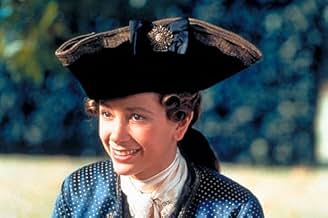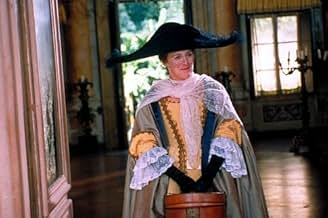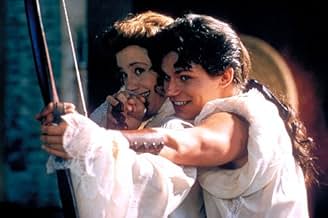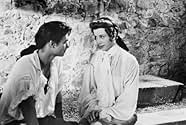AVALIAÇÃO DA IMDb
5,8/10
1,7 mil
SUA AVALIAÇÃO
Adicionar um enredo no seu idiomaA Princess is determined to restore her homeland's throne to its rightful heir, a young Prince with whom she falls in love.A Princess is determined to restore her homeland's throne to its rightful heir, a young Prince with whom she falls in love.A Princess is determined to restore her homeland's throne to its rightful heir, a young Prince with whom she falls in love.
- Direção
- Roteiristas
- Artistas
- Prêmios
- 4 indicações no total
Avaliações em destaque
I really wanted to like "Triumph of Love;" several of the elements, in fact, might be organized into a film I could enjoy. There's the elegant period sets and costumes, the gender-bending undertones, a couple comic servants, and Ben Kingsley and Fiona Shaw giving fine performances as a pair of emotion-disdaining intellectuals who become undone by their own vanity. But "Triumph of Love," sadly, proves to be all promise and very little payoff.
Mira Sorvino is the princess of an unspecified (and presumably fictitious) country, who infiltrates the house of her political enemies disguised as a man. Her purpose is twofold: to right the wrongs wrought by her father on true heir to the throne Agis (Jay Rodan), and to win Agis' heart, which has been taught to disdain love by his guardians Hermocrates (Kingsley) and Leontine (Shaw). Since nobody can do anything the easy way in a story like this, Sorvino's character works towards her ends by wooing Leontine (who thinks she's a guy), Hermocrates, and Agis (both of whom are in on her ruse) at the same time. That's the setup; unfortunately, it's also the majority of the film. Comedy of this sort usually hits its stride when complications entangle the protagonist's original design. Here, the difficulties are introduced to late and resolved too quickly for us to care. Meanwhile, a handful of servants are thrown into the plot and then given almost nothing to do either within or apart from it.
Nor does director Clare Peploe help her case much. Several scenes consist of choppy, distracting cuts--and not even cuts from different angles, but cuts from the same angle, giving the impression of a bargain-basement film cobbled together with the only pieces of film that were usable. Images of a "modern-day" audience peeking in on the action add nothing to the procedings, and are introduced in such a way as to feel like an intrusion on the film, rather than a part of it.
For a much richer experience in this genre, I recommend the recent adaptation of Shakespeare's "Twelfth Night." Like "Triumph of Love," it features a cross-dressing heroine, romantic entanglements and misunderstandings, comical servants, and a good turn by Ben Kingsley in a supporting role. But it also contains infectuous life and energy and a story that dances merrily on its way rather than walking sedately. Also Imogen Stubbs, as the gender-defying central character, makes a much more convincing man than Mira Sorvino.
Mira Sorvino is the princess of an unspecified (and presumably fictitious) country, who infiltrates the house of her political enemies disguised as a man. Her purpose is twofold: to right the wrongs wrought by her father on true heir to the throne Agis (Jay Rodan), and to win Agis' heart, which has been taught to disdain love by his guardians Hermocrates (Kingsley) and Leontine (Shaw). Since nobody can do anything the easy way in a story like this, Sorvino's character works towards her ends by wooing Leontine (who thinks she's a guy), Hermocrates, and Agis (both of whom are in on her ruse) at the same time. That's the setup; unfortunately, it's also the majority of the film. Comedy of this sort usually hits its stride when complications entangle the protagonist's original design. Here, the difficulties are introduced to late and resolved too quickly for us to care. Meanwhile, a handful of servants are thrown into the plot and then given almost nothing to do either within or apart from it.
Nor does director Clare Peploe help her case much. Several scenes consist of choppy, distracting cuts--and not even cuts from different angles, but cuts from the same angle, giving the impression of a bargain-basement film cobbled together with the only pieces of film that were usable. Images of a "modern-day" audience peeking in on the action add nothing to the procedings, and are introduced in such a way as to feel like an intrusion on the film, rather than a part of it.
For a much richer experience in this genre, I recommend the recent adaptation of Shakespeare's "Twelfth Night." Like "Triumph of Love," it features a cross-dressing heroine, romantic entanglements and misunderstandings, comical servants, and a good turn by Ben Kingsley in a supporting role. But it also contains infectuous life and energy and a story that dances merrily on its way rather than walking sedately. Also Imogen Stubbs, as the gender-defying central character, makes a much more convincing man than Mira Sorvino.
This movie is about a princess simultaneously seducing a prince, his protégé and the protégé's sister, portraying herself as either a man or woman, all in the name of undoing a wrong that her family has done to the prince's a long time ago. It has some wit, with some wordplay, some farce comedy, and the slow breakdown of each of the character giving in to her seduction. But the buildup and final revelation at the end does not have the usual Shakespearean touch, where she would get closer and closer to being revealed, until a final big bang. This film just didn't have that, although it did produce some laughs when the protégé and his sister both come out dressed in clothes they otherwise would never be caught wearing.
The camerawork plays a bit with its jump cuts, trying to impose some sense of realism to this otherwise lack of stagey feeling film. The sudden revelation of the audience did not occur frequently enough to signify anything beyond an aberration of the plot.
Still, an interesting film with good interaction between characters, and a little insight to French plays of that period.
The camerawork plays a bit with its jump cuts, trying to impose some sense of realism to this otherwise lack of stagey feeling film. The sudden revelation of the audience did not occur frequently enough to signify anything beyond an aberration of the plot.
Still, an interesting film with good interaction between characters, and a little insight to French plays of that period.
Truly a remarkable film for its ups and downs. The ups are delightful (dialog, costuming, movement); the downs are simply awful (acting, timing, editing, concept). The "jump" cutting, so dear to advertisers, becomes extremely annoying. The reference to the play as play by intercutting scenes of modern-day audience watching the play and the cast "curtain call" in modern day dress are distracting. I wish they gave us the English to the French song at the end -- it's probably the best part, and my French is only good enough to guess at the meaning. It was also reformatted for the screen (TV) which already gives it two strikes in my opinion. The 18th century French must have loved it.
"Triumph of Love" is a silly little comedy about a woman (Sorvino) who dresses like a man to woo a woman and reveals her true sex to two men to woo them. The plot and her motives are elsewhere on this site. Having done that, she continues the scam on and on, engaging the trio of hapless would-be love interests over and over until the plot wears down to a nub. "Triumph..." is theater on film; a fact of which we're reminded by shots of an audience cloistered among the garden shrubs...an annoying interjection. A clumsy adaptation of theater for film, "Triumph..." will likely be of interest by only the most ardent aficionados of period plays. (C+)
i loved this movie. it was fun, humorous, entertaining, and witty. the play was first performed in 1732 but i think the plot meets (and excels) today's standards. Mira Sorvino did a great job as did all of the other cast members.
if you liked Oscar Wilde's "The Importance of Being Earnest" or any Shakespearean style plots of mistaken identity, deception, lies, love, comedic betrayal, and that sort of thing, you will enjoy this movie.
(of course it is supposed to take place in France, but as everyone knows, they apparently all speak with English accents there. ha ha.)
if you liked Oscar Wilde's "The Importance of Being Earnest" or any Shakespearean style plots of mistaken identity, deception, lies, love, comedic betrayal, and that sort of thing, you will enjoy this movie.
(of course it is supposed to take place in France, but as everyone knows, they apparently all speak with English accents there. ha ha.)
Você sabia?
- CuriosidadesThis movie is based upon a famous eighteenth century play by Pierre de Marivaux. In keeping with its theatrical roots, there are brief shots interspersed throughout of a modern audience in the garden.
- Citações
The Princess: I'm losing track of my own plot. I'm suppose to be eloping with two different fiancees and having two secret marriages.
- ConexõesReferences Frankenstein (1931)
- Trilhas sonorasOverture from the Opera DON GIOVANNI
By Wolfgang Amadeus Mozart (as W.A.Mozart)
Orchestra: The City of Prague Philharmonic Orchestra (as The City of Prague Philharmonic)
Conducted by Jason Osborn
Principais escolhas
Faça login para avaliar e ver a lista de recomendações personalizadas
- How long is The Triumph of Love?Fornecido pela Alexa
Detalhes
- Data de lançamento
- Países de origem
- Central de atendimento oficial
- Idiomas
- Também conhecido como
- The Triumph of Love
- Locações de filme
- Empresas de produção
- Consulte mais créditos da empresa na IMDbPro
Bilheteria
- Orçamento
- US$ 5.000.000 (estimativa)
- Faturamento bruto nos EUA e Canadá
- US$ 447.267
- Fim de semana de estreia nos EUA e Canadá
- US$ 60.507
- 21 de abr. de 2002
- Faturamento bruto mundial
- US$ 501.442
- Tempo de duração1 hora 52 minutos
- Cor
- Mixagem de som
- Proporção
- 1.85 : 1
Contribua para esta página
Sugerir uma alteração ou adicionar conteúdo ausente

Principal brecha
By what name was O Triunfo do Amor (2001) officially released in India in English?
Responda


























